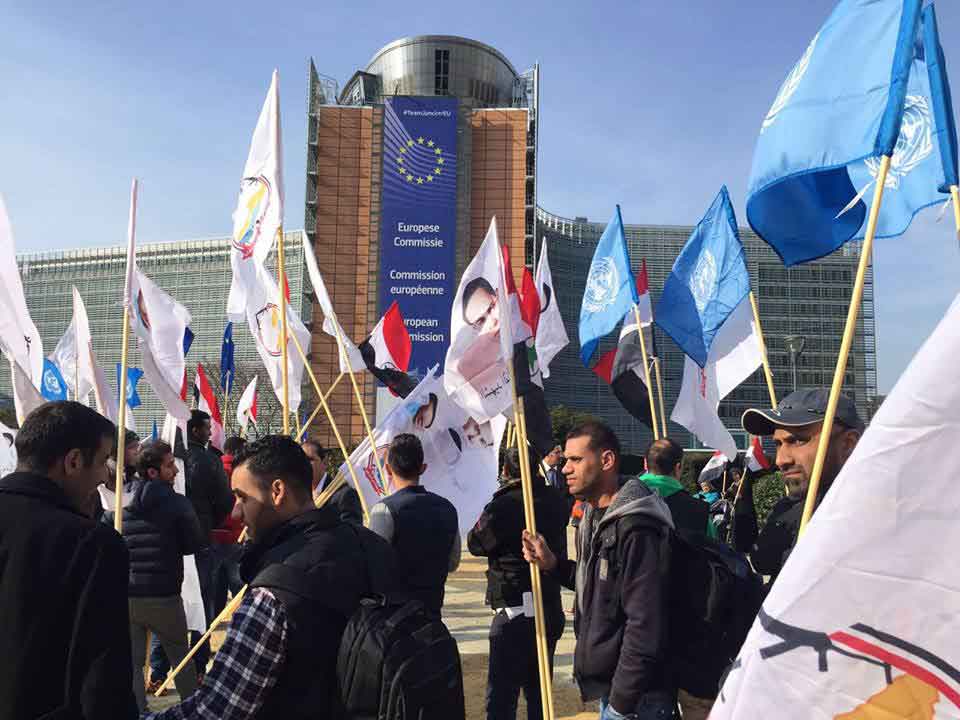Ahwazi Community In Belgium Protest EU’s Silence On Ongoing Human Rights Abuses In Al-Ahwaz
By Rahim Hamid
11 March, 2016
Countercurrents.org

Ahwazi Arab community held a protest in Brussels, the Belgian capital, before the European Parliament and its institutions on Thursday, March 10, 2016 to denounce the continuous silence of the European Union regarding the appalling human rights violations that are ongoing in Al-Ahwaz.
The protesters decried the fact that the EU has neglected human rights abuses in Iran particularly the atrocities perpetrated against Ahwazi Arabs since the nuclear agreement.
The Ahwazi organizers said the European Union cannot excuse its silence. In an interview with Al-Arabiya; "For the Ahwazi people who are under the nine decades of Iranian oppression what matters most is freedom and having the right to self-determination,” said Yaqoub Hor Altostari, the official spokesman of the Arab Struggle Movement for the Liberation of Al-Ahwaz. “The nuclear agreement is not resolving any human rights issues. European governments are characterized by their democratic values. They have set them aside while they were negotiating this agreement.”
The Ahwazi protesters sent a message of support and solidarity to hundreds of Ahwazi prisoners in Iranian regime dark prisons.
The regime frequently applies charges such as Moharebeh or ‘enmity to God’ – an indefinite, all-encompassing accusation – against Ahwazi Arab activists and any other campaigners for freedom and human rights in Iran, with Ahwazis also routinely charged with such ‘crimes’ as supporting separatism or teaching Arabic; all these ‘crimes’ can incur harsh sentences, including lengthy prison terms and the death penalty.
The UN’s Special Rapporteur on Human Rights, as well as international human rights organisations including Amnesty International, Human Rights Watch and regional human rights monitors have condemned the regime’s unfair trials in which detainees have no access to legal counsel, and its execution rate; Iran is second only to China in the rate of executions per capita globally, with over 2,500 executed since President Rouhani came to office in 2013.
This demonstration was a part of series of recent demonstrations in Copenhagen, The Hague, Vienna, and Stockholm as well as other activities that undertaken by the Arab Struggle for the Liberation of Ahwaz as an effort to expose the ferocious occupation policies of the Iranian regime. In addition, to make heard the oppressed voice of Ahwazi Arabs who are under extreme oppression from the occupation by Iran, the likes of which is not known to the world as a whole, despite the objective brutality of this heinous occupation.
The attempted annihilation of a nation’s or people’s language or culture is no less an aspect of genocide than the attempted extermination of the people themselves; Ahwazis and other ethnic groups in so-called Iran have been subjected to these brutal, calculated and systemic efforts to annihilate their language and culture since their lands were first occupied and then forcibly annexed by what was then known as Persia. Although these efforts to destroy the Ahwazi people’s language and culture have been unsuccessful, this is solely due to the heroic resistance of the Ahwazi people in refusing to allow this core aspect of identity to be wiped out, despite the murderous penalties for doing so.
It should not be forgotten that the vast majority of Iranian and international political and human rights organizations, including the UN’s human rights bodies, have, however unwittingly, acted as tacit accomplices in this genocide of Ahwazis and non-Persian people under Iranian dominion and occupation. They have attained this status by wilfully ignoring the terrible and continuing injustices and human rights abuses against these groups and taking no action to pressure the rulers in Tehran, past or present. They have not intervened to introduce even the most fundamental human rights legislation, ensuring that the Ahwazis and other ethnic groups can receive education in their own languages to help preserve their national, ethnic and cultural identities.
Approximately 99% of Iran’s oil and gas wealth is extracted from oil fields in Ahwazi areas, while the marginalized Ahwazi peoples live in utter destitution near the flames from the oilfields on their own land.
In the modern time, the conventional centralized nation-states are incapable of maintaining their existence, and their incompetence has more than ever been evident. Therefore, the proposal and implementation of democratic alternative with the potential to overcome the resultant barriers of the nation-states has appeared to be a crucial point. Iranian state is the example of a dysfunctional system. Under Iranian state, there is no room or an opportunity to talk about the national rights of Ahwazi Arabs Kurds, Turks, and Baluchis, let alone talking about the right of peoples to self-determination. The classic and fixed definition of the right to self-determination is the right of people to choose and build their own political and economic future and present system.
Ahwazi people with their identity seeking and liberationist movement have been for years campaigning for the preservation of their entities and freedom but despite their long struggle, they have been suppressed by the Iranian state that has been using all its force just to keep its Persian nation state on the account of other non-Persian people in Iran.
This policy of subjugation is sowing the seeds of eventual unavoidable seismic changes within Iran, with the eventual break-up of the forcibly assembled occupied territories which it claims dominion over being an inevitable consequence – there is no question for anyone familiar with the subject that this will eventually happen; the only question is when.
Rahim Hamid is an Ahwazi freelance journalist

